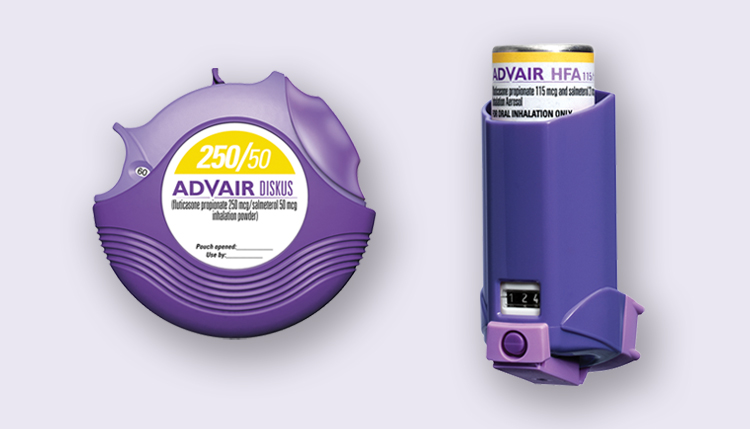ADVAIR DISKUS is a prescription medicine used to treat asthma in patients 4 years and older. ADVAIR HFA is a prescription medicine used to treat asthma in patients 12 years and older. ADVAIR is not for adults and children with asthma who are well controlled with an asthma control medicine, such as an inhaled corticosteroid (ICS) medicine. ADVAIR is for adults and children with asthma who need both an ICS and long-acting beta2-adrenergic agonist (LABA) medicine.
ADVAIR DISKUS is a prescription medicine used to treat asthma in patients 4 years and older. ADVAIR HFA is a prescription medicine used to treat asthma in patients 12 years and older. ADVAIR is not for adults and children with asthma who are well controlled with an asthma control medicine, such as an inhaled corticosteroid (ICS) medicine. ADVAIR is for adults and children with asthma who need both an ICS and long-acting beta2-adrenergic agonist (LABA) medicine.
ADVAIR DISKUS is a prescription medicine used to treat asthma in patients 4 years and older. ADVAIR HFA is a prescription medicine used to treat asthma in patients 12 years and older. ADVAIR is not for adults and children with asthma who are well controlled with an asthma control medicine, such as an inhaled corticosteroid (ICS) medicine. ADVAIR is for adults and children with asthma who need both an ICS and long-acting beta2-adrenergic agonist (LABA) medicine.
ADVAIR DISKUS 250/50 is a twice-daily prescription medicine used long term to treat chronic obstructive pulmonary disease (COPD), including chronic bronchitis, emphysema, or both, for better breathing and fewer flare-ups. ADVAIR HFA is not approved for the treatment of COPD.
ADVAIR is not used to relieve sudden breathing problems from asthma or COPD and won’t replace a rescue inhaler.
- ADVAIR contains salmeterol, the same medicine found in SEREVENT DISKUS (salmeterol xinafoate inhalation powder). LABA medicines such as salmeterol when used alone increase the risk of hospitalizations and death from asthma problems. ADVAIR contains an ICS and a LABA. When an ICS and LABA are used together, there is not a significant increased risk in hospitalizations and death from asthma problems.
- ADVAIR contains salmeterol, the same medicine found in SEREVENT DISKUS (salmeterol xinafoate inhalation powder). LABA medicines such as salmeterol when used alone increase the risk of hospitalizations and death from asthma problems. ADVAIR contains an ICS and a LABA. When an ICS and LABA are used together, there is not a significant increased risk in hospitalizations and death from asthma problems.
- ADVAIR contains salmeterol, the same medicine found in SEREVENT DISKUS (salmeterol xinafoate inhalation powder). LABA medicines such as salmeterol when used alone increase the risk of hospitalizations and death from asthma problems. ADVAIR contains an ICS and a LABA. When an ICS and LABA are used together, there is not a significant increased risk in hospitalizations and death from asthma problems.
- Do not use ADVAIR to treat sudden breathing problems from asthma or COPD. Always have a rescue inhaler with you to treat sudden symptoms.
- Do not use ADVAIR DISKUS if you have a severe allergy to milk proteins. Do not use ADVAIR if you are allergic to any of the ingredients in the products. Ask your healthcare provider if you are not sure.
- Do not use ADVAIR more often than prescribed.
- Do not take ADVAIR with other medicines that contain a LABA for any reason.
- Tell your healthcare provider about all the medicines you take and about all of your health conditions.
- Call your healthcare provider or get medical care right away if your breathing problems get worse, if you need your rescue inhaler more often than usual or it does not work as well to relieve your symptoms, or if your peak flow meter results decrease. Your healthcare provider will tell you the numbers that are right for you.
- ADVAIR can cause serious side effects, including:
- fungal infection in your mouth or throat (thrush). Rinse your mouth with water without swallowing after using ADVAIR to help reduce your chance of getting thrush.
- pneumonia. People with COPD have a higher chance of getting pneumonia. ADVAIR DISKUS may increase the chance of getting pneumonia. Call your healthcare provider if you notice any of the following symptoms: increase in mucus (sputum) production; change in mucus color; fever; chills; increased cough; increased breathing problems.
- weakened immune system and increased chance of getting infections (immunosuppression). You should avoid exposure to chickenpox and measles, and, if exposed, tell your healthcare provider right away. Worsening of existing tuberculosis; fungal, bacterial, viral, or parasitic infections; or herpes infection of the eye (ocular herpes simplex) may occur.
- reduced adrenal function. This can happen when you stop taking an oral corticosteroid (such as prednisone) and start taking a medicine containing an inhaled corticosteroid (such as ADVAIR). During this transition period, when your body is under stress such as from fever, trauma (such as a car accident), infection, surgery, or worse COPD symptoms, adrenal insufficiency can get worse and may cause death. Symptoms of adrenal insufficiency include: feeling tired; lack of energy; weakness; nausea and vomiting; low blood pressure (hypotension).
- sudden breathing problems immediately after inhaling your medicine. If you have sudden breathing problems immediately after inhaling your medicine, stop using ADVAIR and call your healthcare provider right away.
- serious allergic reactions. Call your healthcare provider or get emergency medical care if you get any of the following symptoms of a serious allergic reaction: rash; hives; swelling of your face, mouth, and tongue; breathing problems.
- effects on heart: increased blood pressure; a fast or irregular heartbeat; chest pain.
- effects on nervous system: tremor; nervousness.
- bone thinning or weakness (osteoporosis).
- slowed growth in children. A child’s growth should be checked regularly by the healthcare provider.
- eye problems including glaucoma, increased pressure in your eye, cataracts, or other changes in vision. You should have regular eye exams while using ADVAIR.
- changes in laboratory blood levels (sugar, potassium, certain types of white blood cells).
- Common side effects of ADVAIR DISKUS for asthma include upper respiratory tract infection, throat irritation, hoarseness and voice changes, thrush in your mouth or throat, bronchitis, cough, headache, and nausea and vomiting. In children with asthma, infections in the ear, nose, and throat are common.
- Common side effects of ADVAIR DISKUS 250/50 for COPD include thrush in your mouth or throat, throat irritation, hoarseness and voice changes, viral respiratory infections, headache, and muscle and bone pain.
- Common side effects of ADVAIR HFA for asthma include upper respiratory tract infection, throat irritation, hoarseness and voice changes, headache, dizziness, and nausea and vomiting.
- Rinse your mouth with water without swallowing after using ADVAIR to help reduce your chance of getting thrush.





